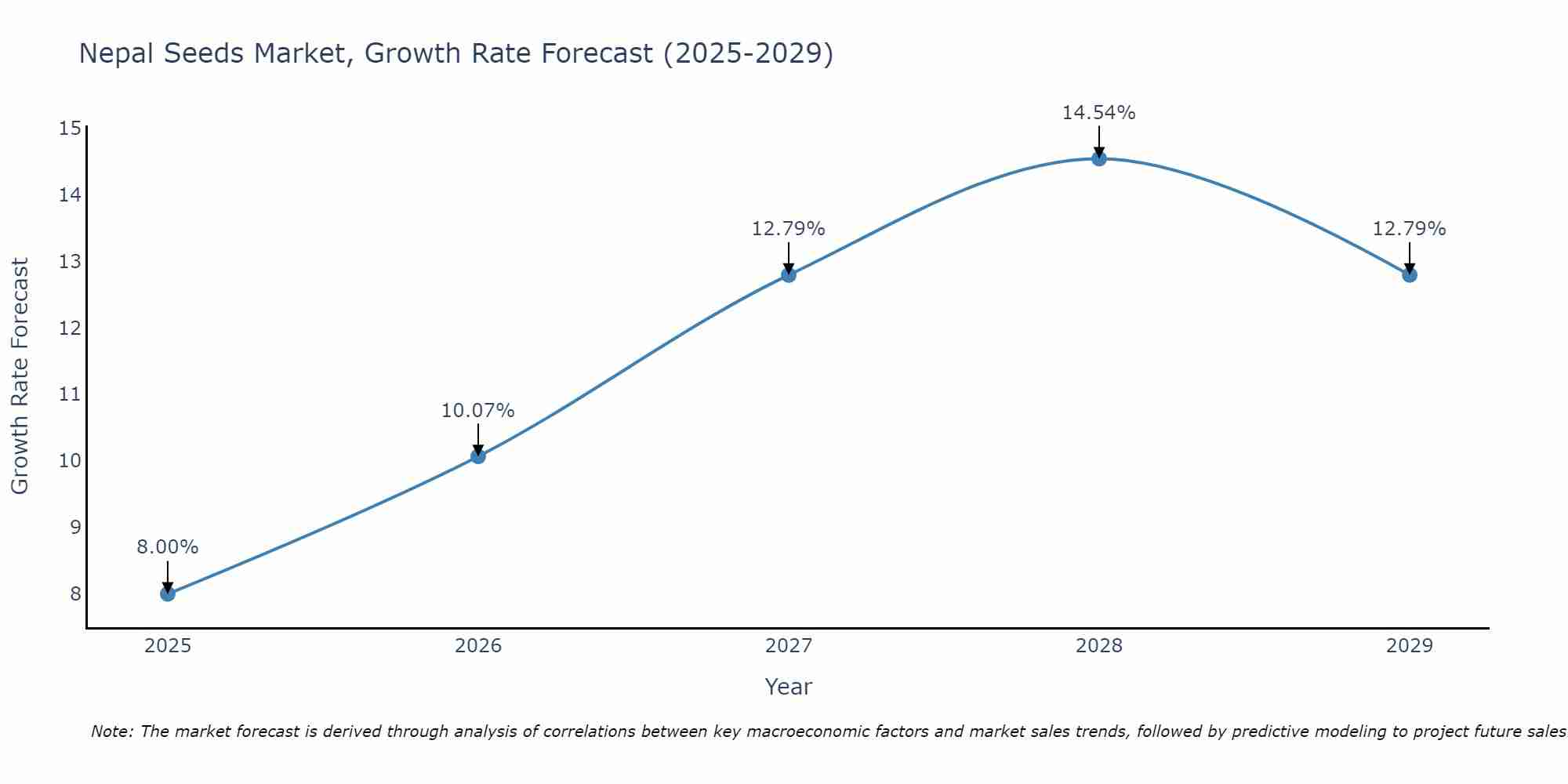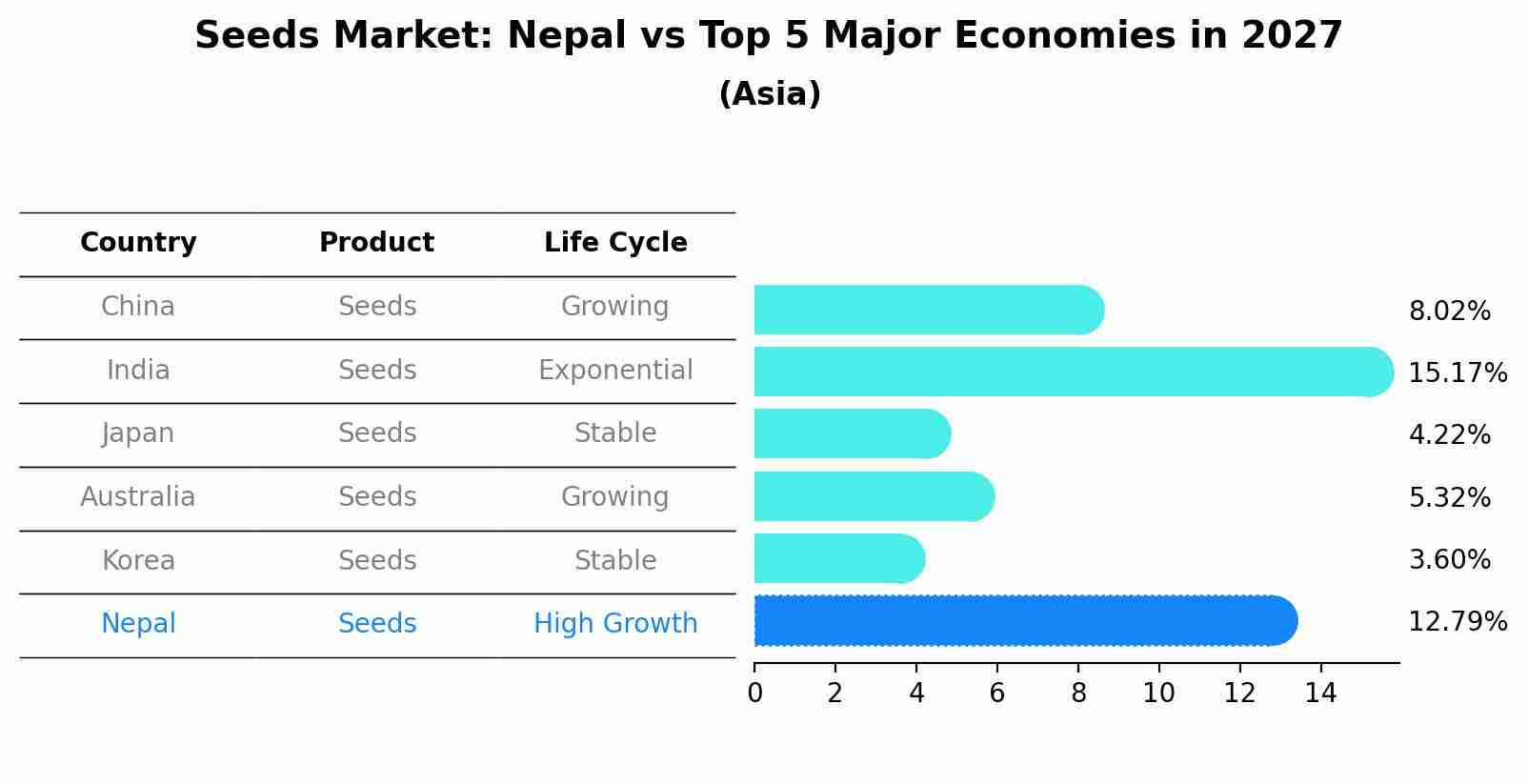Nepal Seeds Market (2025-2031) Outlook | Analysis, Companies, Growth, Trends, Value, Industry, Size, Revenue, Forecast & Share
| Product Code: ETC384696 | Publication Date: Aug 2022 | Updated Date: Jul 2025 | Product Type: Market Research Report | |
| Publisher: 6Wresearch | Author: Bhawna Singh | No. of Pages: 75 | No. of Figures: 35 | No. of Tables: 20 |
Nepal Seeds Market Size Growth Rate
The Nepal Seeds Market is projected to witness mixed growth rate patterns during 2025 to 2029. Growth accelerates to 14.54% in 2028, following an initial rate of 8.00%, before easing to 12.79% at the end of the period.

Seeds Market: Nepal vs Top 5 Major Economies in 2027 (Asia)
The Seeds market in Nepal is projected to grow at a high growth rate of 12.79% by 2027, highlighting the country's increasing focus on advanced technologies within the Asia region, where China holds the dominant position, followed closely by India, Japan, Australia and South Korea, shaping overall regional demand.

Nepal Seeds Market Synopsis
The Nepal seeds market is witnessing steady growth driven by increasing demand for high-quality seeds to enhance agricultural productivity. The market is primarily dominated by domestic seed companies that offer a wide range of crops including rice, maize, wheat, vegetables, and fruits. Farmers are increasingly adopting hybrid and genetically modified seeds to improve crop yield and resilience to pests and diseases. Key factors influencing the market include government initiatives to promote modern agricultural practices, rising awareness among farmers regarding the benefits of quality seeds, and the growing need to ensure food security in the face of climate change. However, challenges such as limited access to credit, lack of awareness about seed varieties, and counterfeit seed products hinder market growth. Overall, the Nepal seeds market presents opportunities for seed companies to innovate and collaborate with farmers to meet the evolving demands of the agricultural sector.
Nepal Seeds Market Trends
The Nepal Seeds Market is experiencing a shift towards organic and high-yielding hybrid seeds due to increasing awareness about sustainable agriculture practices. Farmers are increasingly looking for seeds that can withstand climate change effects and pests while ensuring better crop yields. There is a growing demand for vegetables, fruits, and cereals seeds, with a focus on varieties that are disease-resistant and adaptable to different agro-climatic conditions. Additionally, the market is witnessing a rise in the adoption of biotechnological advancements in seed breeding and production processes. Collaborations between research institutions, seed companies, and farmers are also on the rise to develop and promote improved seed varieties. Overall, the Nepal Seeds Market is evolving towards more sustainable and innovative seed solutions to meet the changing needs of the agriculture sector.
Nepal Seeds Market Challenges
In the Nepal Seeds Market, several challenges are prevalent. One major hurdle is the lack of access to high-quality seeds for farmers, leading to low agricultural productivity. Additionally, inadequate infrastructure for seed production, storage, and distribution further hinders the market`s growth. Limited awareness among farmers about modern seed varieties and their benefits also poses a challenge. Furthermore, the presence of counterfeit or low-quality seeds in the market raises concerns about crop yield and quality. Regulatory issues and a fragmented market structure add complexity to the seed industry in Nepal. These challenges collectively impact the overall efficiency and competitiveness of the Nepal Seeds Market, requiring strategic interventions and investment to overcome them.
Nepal Seeds Market Investment Opportunities
The Nepal Seeds Market presents various investment opportunities for both domestic and foreign investors. With a growing demand for high-quality seeds due to the increasing adoption of modern agricultural practices, there is a need for improved seed varieties that can help enhance crop productivity and resilience to climate change. Investing in the production and distribution of certified seeds for key crops such as rice, maize, vegetables, and pulses can be profitable. Additionally, there is potential in investing in seed processing and packaging facilities to meet the quality standards required for domestic and export markets. Collaborating with local farming communities and research institutions for seed development projects can also be a strategic investment to tap into the growing agricultural sector in Nepal.
Jordan Agar Market Government Policies
The Nepal government has implemented several policies to regulate and promote the seeds market in the country. The Seed Act of 2049 BS (1992) governs the production, distribution, and quality control of seeds, ensuring that only certified and quality seeds are available to farmers. The government has also established the Nepal Agricultural Research Council (NARC) to conduct research and development in the seed sector, aiming to enhance crop productivity and promote sustainable agriculture. Additionally, the government provides subsidies and incentives to encourage farmers to use improved seeds and adopt modern agricultural practices. These policies aim to safeguard farmers` interests, promote the growth of the agricultural sector, and ensure food security in Nepal.
Nepal Seeds Market Future Outlook
The Nepal Seeds Market is expected to witness steady growth in the coming years, driven by increasing demand for high-quality seeds to boost agricultural productivity and address food security challenges. Factors such as government initiatives to promote modern farming practices, rising adoption of hybrid and genetically modified seeds, and growing awareness among farmers regarding the benefits of using improved seed varieties are likely to contribute to market expansion. Additionally, the rise in commercial farming activities, coupled with advancements in seed technologies and research, will further fuel market growth. However, challenges such as limited access to credit, lack of infrastructure, and climate change impacts may pose constraints to the market`s development. Overall, the Nepal Seeds Market presents opportunities for seed companies to innovate and cater to the evolving needs of the agricultural sector.
Key Highlights of the Report:
- Nepal Seeds Market Outlook
- Market Size of Nepal Seeds Market, 2024
- Forecast of Nepal Seeds Market, 2031
- Historical Data and Forecast of Nepal Seeds Revenues & Volume for the Period 2021 - 2031
- Nepal Seeds Market Trend Evolution
- Nepal Seeds Market Drivers and Challenges
- Nepal Seeds Price Trends
- Nepal Seeds Porter's Five Forces
- Nepal Seeds Industry Life Cycle
- Historical Data and Forecast of Nepal Seeds Market Revenues & Volume By Type for the Period 2021 - 2031
- Historical Data and Forecast of Nepal Seeds Market Revenues & Volume By Genetically Modified (GM) Seed for the Period 2021 - 2031
- Historical Data and Forecast of Nepal Seeds Market Revenues & Volume By Conventional Seed for the Period 2021 - 2031
- Historical Data and Forecast of Nepal Seeds Market Revenues & Volume By Crop for the Period 2021 - 2031
- Historical Data and Forecast of Nepal Seeds Market Revenues & Volume By Field Crops for the Period 2021 - 2031
- Historical Data and Forecast of Nepal Seeds Market Revenues & Volume By Fruit & Vegetable Crops for the Period 2021 - 2031
- Historical Data and Forecast of Nepal Seeds Market Revenues & Volume By Availability for the Period 2021 - 2031
- Historical Data and Forecast of Nepal Seeds Market Revenues & Volume By Commercial Seeds for the Period 2021 - 2031
- Historical Data and Forecast of Nepal Seeds Market Revenues & Volume By Saved Seeds for the Period 2021 - 2031
- Historical Data and Forecast of Nepal Seeds Market Revenues & Volume By Seed Treatment for the Period 2021 - 2031
- Historical Data and Forecast of Nepal Seeds Market Revenues & Volume By Treated for the Period 2021 - 2031
- Historical Data and Forecast of Nepal Seeds Market Revenues & Volume By Untreated for the Period 2021 - 2031
- Historical Data and Forecast of Nepal Seeds Market Revenues & Volume By Seed Trait for the Period 2021 - 2031
- Historical Data and Forecast of Nepal Seeds Market Revenues & Volume By Herbicide Tolerant for the Period 2021 - 2031
- Historical Data and Forecast of Nepal Seeds Market Revenues & Volume By Insecticide Resistant for the Period 2021 - 2031
- Historical Data and Forecast of Nepal Seeds Market Revenues & Volume By Other Stacked Traits for the Period 2021 - 2031
- Nepal Seeds Import Export Trade Statistics
- Market Opportunity Assessment By Type
- Market Opportunity Assessment By Crop
- Market Opportunity Assessment By Availability
- Market Opportunity Assessment By Seed Treatment
- Market Opportunity Assessment By Seed Trait
- Nepal Seeds Top Companies Market Share
- Nepal Seeds Competitive Benchmarking By Technical and Operational Parameters
- Nepal Seeds Company Profiles
- Nepal Seeds Key Strategic Recommendations
Frequently Asked Questions About the Market Study (FAQs):
- Single User License$ 1,995
- Department License$ 2,400
- Site License$ 3,120
- Global License$ 3,795
Search
Thought Leadership and Analyst Meet
Our Clients
Related Reports
- Canada Oil and Gas Market (2026-2032) | Share, Segmentation, Value, Industry, Trends, Forecast, Analysis, Size & Revenue, Growth, Competitive Landscape, Outlook, Companies
- Germany Breakfast Food Market (2026-2032) | Industry, Share, Growth, Size, Companies, Value, Analysis, Revenue, Trends, Forecast & Outlook
- Australia Briquette Market (2025-2031) | Growth, Size, Revenue, Forecast, Analysis, Trends, Value, Share, Industry & Companies
- Vietnam System Integrator Market (2025-2031) | Size, Companies, Analysis, Industry, Value, Forecast, Growth, Trends, Revenue & Share
- ASEAN and Thailand Brain Health Supplements Market (2025-2031) | Strategy, Consumer Insights, Analysis, Investment Trends, Opportunities, Growth, Size, Share, Industry, Revenue, Segments, Value, Segmentation, Supply, Forecast, Restraints, Outlook, Competition, Drivers, Trends, Demand, Pricing Analysis, Competitive, Strategic Insights, Companies, Challenges
- ASEAN Bearings Market (2025-2031) | Strategy, Consumer Insights, Analysis, Investment Trends, Opportunities, Growth, Size, Share, Industry, Revenue, Segments, Value, Segmentation, Supply, Forecast, Restraints, Outlook, Competition, Drivers, Trends, Demand, Pricing Analysis, Competitive, Strategic Insights, Companies, Challenges
- Europe Flooring Market (2025-2031) | Outlook, Share, Industry, Trends, Forecast, Companies, Revenue, Size, Analysis, Growth & Value
- Saudi Arabia Manlift Market (2025-2031) | Outlook, Size, Growth, Trends, Companies, Industry, Revenue, Value, Share, Forecast & Analysis
- Uganda Excavator, Crane, and Wheel Loaders Market (2025-2031) | Strategy, Consumer Insights, Analysis, Investment Trends, Opportunities, Growth, Size, Share, Industry, Revenue, Segments, Value, Segmentation, Supply, Forecast, Restraints, Outlook, Competition, Drivers, Trends, Demand, Pricing Analysis, Competitive, Strategic Insights, Companies, Challenges
- Rwanda Excavator, Crane, and Wheel Loaders Market (2025-2031) | Strategy, Consumer Insights, Analysis, Investment Trends, Opportunities, Growth, Size, Share, Industry, Revenue, Segments, Value, Segmentation, Supply, Forecast, Restraints, Outlook, Competition, Drivers, Trends, Demand, Pricing Analysis, Competitive, Strategic Insights, Companies, Challenges
Industry Events and Analyst Meet
Whitepaper
- Middle East & Africa Commercial Security Market Click here to view more.
- Middle East & Africa Fire Safety Systems & Equipment Market Click here to view more.
- GCC Drone Market Click here to view more.
- Middle East Lighting Fixture Market Click here to view more.
- GCC Physical & Perimeter Security Market Click here to view more.
6WResearch In News
- Doha a strategic location for EV manufacturing hub: IPA Qatar
- Demand for luxury TVs surging in the GCC, says Samsung
- Empowering Growth: The Thriving Journey of Bangladesh’s Cable Industry
- Demand for luxury TVs surging in the GCC, says Samsung
- Video call with a traditional healer? Once unthinkable, it’s now common in South Africa
- Intelligent Buildings To Smooth GCC’s Path To Net Zero


















